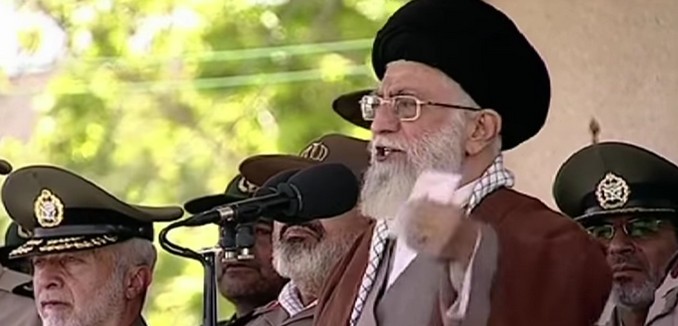Iranian Supreme Leader Ayatollah Ali Khamenei publicly ruled out international inspections of military sites or interviews with nuclear scientists, two measures that would be necessary for a deal to ensure that Iran’s nuclear program is for peaceful purposes only.
Reuters reported today:
The comments, broadcast live on state TV, were the latest in a series of forthright statements on inspections in the countdown to a June 30 deadline to resolve a decade-old standoff over Iran’s nuclear work.
“We will never yield to pressure … We will not accept unreasonable demands … Iran will not give access to its (nuclear) scientists,” Khamenei said. …
Khamenei, who has the final say for Iran on any deal, last month ruled out any “extraordinary supervision measures” over nuclear activities and said military sites could not be inspected.
Inspecting Iranian military sites, including Parchin, where Iran is believed to have tested detonators that could be used for a nuclear weapons, is vital to establishing if Iran has a secret military nuclear program, as is interviewing scientists about their past research. Last October, Omri Ceren, The Israel Project’s managing director for press and strategy, explained why such information is essential to a robust verification regime.
At stake are international concerns over the so-called possible military dimensions (PMDs) of the Iranian nuclear program, the central significance of which has sometimes been underplayed by voices within the foreign policy community. While the P5+1 is charged with negotiating over Iran’s uranium work, its plutonium work, and its ballistic missile work – all of which the Iranians are obligated by half a dozen United Nations Security Council (UNSC) resolutions to roll back – the IAEA seeks to establish the scope of Iran’s overall atomic program, including in those three more specific areas.
The mandate stretches beyond full-blown weaponization work, and into military involvement in uranium mining, centrifuge construction, and so on. Full Iranian disclosure is considered a minimum to establishing a robust verification regime: The IAEA can’t verify that Iran has met its obligations to limit uranium work, for instance, unless it knows the full scope of the uranium work that’s being done. PMD-related transparency is seen as not just another issue – say, one that Iran could refuse to trade away by making concessions in other areas – but as a prerequisite to verifying Iranian compliance across all issues.
The Israel Project publishes The Tower.
In announcing the emerging deal with Iran last month, President Barack Obama said that “Iran has also agreed to the most robust and intrusive inspections and transparency regime ever negotiated for any nuclear program in history.” Subsequently, Iran’s defense minister, Brig. Gen. Hossein Dehghan, and Behrouz Kamalvandi, the spokesman for the Atomic Energy Organization of Iran, both said that Iran would not open up its military sites for inspection. Iranian foreign minister and chief nuclear negotiator Mohammad Javad Zarif said the Iran would not allow cameras at it military sites.
Iran was required by the terms of the November 2013 Joint Plan of Action to explain its past nuclear work to the International Atomic Energy Agency (IAEA). Its failure to do so has prompted IAEA Director General Yukiya Amano to say that he could not confirm “that all nuclear material in Iran is in peaceful activities.”
[Photo: AFP news agency / YouTube ]




